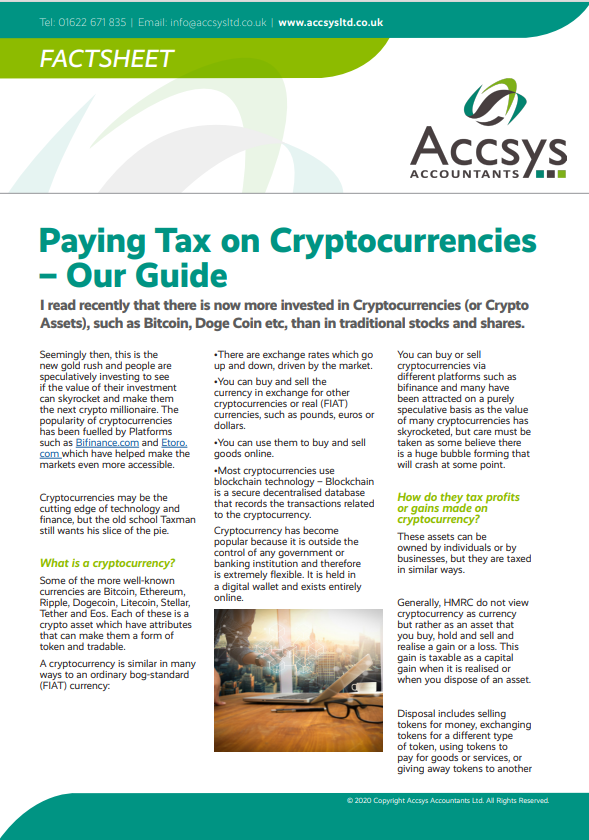Paying Tax on Cryptocurrencies – Our Guide

I read recently that there is now more invested in Cryptocurrencies (or Crypto Assets), such as Bitcoin, Doge Coin etc, than in traditional stocks and shares.
Seemingly then, this is the new gold rush and people are speculatively investing to see if the value of their investment can skyrocket and make them the next crypto millionaire. The popularity of cryptocurrencies has been fuelled by Platforms such as Bifinance.com and Etoro.com which have helped make the markets even more accessible.
Cryptocurrencies may be the cutting edge of technology and finance, but the old school Taxman still wants his slice of the pie.
What is a cryptocurrency?
Some of the more well-known currencies are Bitcoin, Ethereum, Ripple, Dogecoin, Litecoin, Stellar, Tether and Eos. Each of these is a crypto asset which have attributes that can make them a form of token and tradable.
A cryptocurrency is similar in many ways to an ordinary bog-standard (FIAT) currency:
•There are exchange rates which go up and down, driven by the market.
•You can buy and sell the currency in exchange for other cryptocurrencies or real (FIAT) currencies, such as pounds, euros or dollars.
•You can use them to buy and sell goods online.
•Most cryptocurrencies use blockchain technology – Blockchain is a secure decentralised database that records the transactions related to the cryptocurrency.
Cryptocurrency has become popular because it is outside the control of any government or banking institution and therefore is extremely flexible. It is held in a digital wallet and exists entirely online.
You can buy or sell cryptocurrencies via different platforms such as bifinance and many have been attracted on a purely speculative basis as the value of many cryptocurrencies has skyrocketed, but care must be taken as some believe there is a huge bubble forming that will crash at some point.
How do they tax profits or gains made on cryptocurrency?
These assets can be owned by individuals or by businesses, but they are taxed in similar ways.
Generally, HMRC do not view cryptocurrency as currency but rather as an asset that you buy, hold and sell and realise a gain or a loss. This gain is taxable as a capital gain when it is realised or when you dispose of an asset.
Disposal includes selling tokens for money, exchanging tokens for a different type of token, using tokens to pay for goods or services, or giving away tokens to another.
For individuals, gains are subject to the CGT £12,300 allowance each year and you will only pay tax on gains above this amount. No allowance exists for businesses.
Losses can be offset against other gains in the year or rolled forward and offset against future capital gains.
Any costs you incurred on the buying and selling of the asset are allowable for tax.
HMRC may consider there is a trade and therefore profit from the sale of cryptocurrencies would be taxable as income tax, but unless you meet certain criteria this is unlikely or unless you are actively mining currencies.
Record keeping
It’s important to keep detailed records of your cryptocurrency trading activities.
The onus is on you to keep the necessary records for each transaction to enable them to complete your tax return correctly. Records should include:
•Details of the crypto asset
•Type of transaction – purchase or sale
•The number of units involved
•The date of the transaction
•The value of the transaction in pound sterling at the date of the transaction
•The cumulative total of the investment units held
•Bank statements and wallet addresses
Cryptocurrencies have the potential to catch some taxpayers out. As they grow more and more popular, HMRC are likely to use their powers to access the data held by popular trading profits to catch out those who flout the law.
How we can help
Crypto profits must be reported on your personal tax return and we can help by providing you with a template to help you keep your records and then calculate any taxes when the time comes.


